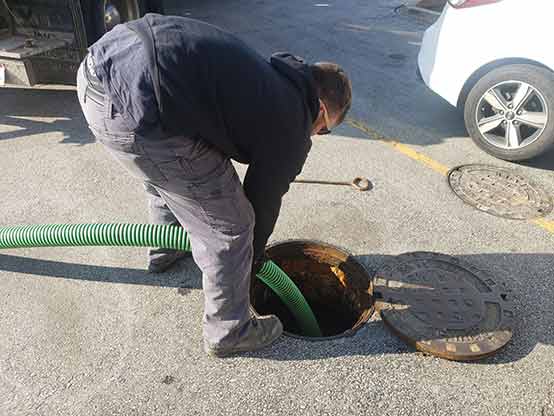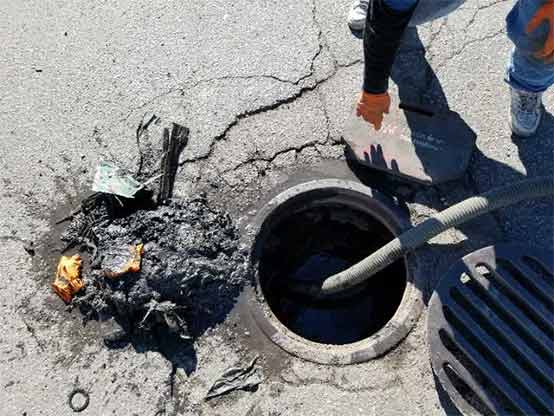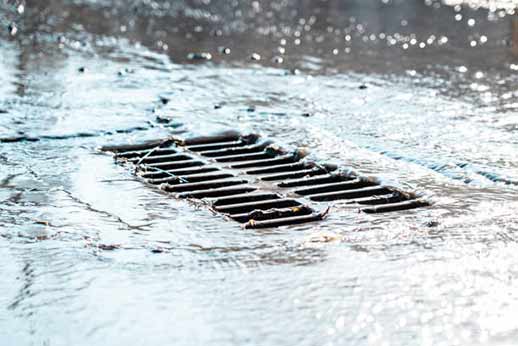
In a large city like Chicago, the importance of cleaning storm drains cannot be stressed enough. With its heavy rainfall and numerous businesses, storm drains play a crucial role in preventing flooding and ensuring the safety and functionality of the city’s infrastructure. Below we get into the significance of regular storm drain cleaning for businesses in Chicago, highlighting the potential consequences of neglecting this essential maintenance task.
The Role of Storm Drains in Chicago
Storm drains are an integral part of Chicago’s drainage system, designed to collect and divert rainwater to prevent flooding. The city’s storm drain network consists of a vast network of pipes, ditches, and catch basins that are strategically placed to efficiently manage stormwater runoff. This network protects local businesses, homes, and roads from becoming inundated during heavy rainfall, reducing the risk of property damage and ensuring the safety of residents and commuters.
However, storm drains can become clogged over time due to various factors, including debris buildup, vegetation growth, and sediment accumulation. Neglected storm drains can lead to a multitude of problems, ranging from localized flooding to more severe consequences, such as compromised structural integrity and environmental contamination.
The Consequences of Neglecting Storm Drain Cleaning
1. Increased Flooding Risk:
When storm drains are clogged, rainwater cannot efficiently flow through the system, leading to localized flooding. This can be particularly troublesome for businesses located in low-lying areas or near water bodies. Flooded parking lots and entranceways can deter customers and disrupt operations, causing financial losses and reputational damage.
2. Structural Damage:
Prolonged neglect of storm drain cleaning can result in water pooling around buildings, which can weaken foundations and cause structural damage. Water seepage into basements and underground storage areas can lead to costly repairs and damage valuable inventory. Additionally, standing water can deteriorate pavement, creating potholes and hazardous driving conditions.
3. Environmental Impact:
Uncleaned storm drains can contribute to water pollution. When debris and sediment accumulate in the drains, they can wash into local water bodies, negatively impacting aquatic ecosystems. The debris can also block natural water flows, causing stagnation and creating habitats for disease-carrying pests.
4. Regulatory Compliance:
Both local and state authorities have regulations in place that require businesses to maintain storm drains properly. Failure to comply with these regulations can result in fines and penalties. Regular cleaning of storm drains not only ensures compliance but also demonstrates a commitment to environmental stewardship and community safety.

Clear storm drains allow rainwater to flow appropriately, preventing hazardous conditions such as standing water and ice formation
The Importance of Regular Storm Drain Cleaning
1. Preventive Maintenance:
Regular storm drain cleaning is a proactive measure to prevent potential issues before they arise. By scheduling routine cleanings, businesses can identify and address any developing problems promptly. This helps minimize flood risks, maintain infrastructure integrity, and mitigate long-term repair costs.
2. Enhanced Safety and Accessibility:
Clear storm drains allow rainwater to flow appropriately, preventing hazardous conditions such as standing water and ice formation. This improves the safety and accessibility of parking areas, entryways, and sidewalks, reducing the risk of accidents for both customers and employees.
3. Protecting the Business Reputation:
A clean and well-maintained business exterior reflects positively on the organization’s reputation. By ensuring storm drains are regularly cleaned, business owners demonstrate a commitment to the community and the environment. This can enhance customer perception, strengthen brand reputation, and potentially attract more clientele.
4. Compliance with Environmental Regulations:
By adhering to storm drain cleaning requirements, businesses fulfill their environmental responsibilities. Compliance with regulations ensures the protection of local water bodies, promotes sustainable practices, and contributes to the overall well-being of the community.
5. Supporting the City’s Infrastructure:
Regular storm drain cleaning is an essential part of maintaining and supporting the city’s overall infrastructure. By keeping storm drains clear, businesses actively contribute to reducing the strain on the drainage system, preventing localized flooding, and preserving the integrity of roads and structures.
Professional Storm Drain Cleaning Services
While some businesses may attempt to clean storm drains in-house, it is often more practical and efficient to hire professional storm drain cleaning services. These specialized companies have the tools, expertise, and knowledge required to tackle various storm drain issues effectively.
Professional storm drain cleaning services typically include:
- Thorough sewer camera inspection and evaluation of the storm drain system
- Removal of debris, sediment, and other obstructions
- High-pressure hydro jet drain cleaning to clear stubborn blockages
- Preventive maintenance to identify potential issues
- Proper disposal of collected waste materials
By outsourcing storm drain cleaning to experts, businesses can benefit from efficient and effective maintenance. Furthermore, professional services help ensure compliance with regulations and guarantee the longevity and functionality of storm drain systems.
To Sum it Up
The significance of cleaning storm drains for businesses in Chicago cannot be overstated. Regular storm drain maintenance is vital to prevent flooding, protect infrastructure, and maintain the city’s overall functionality. Failure to clean storm drains can lead to severe consequences, including increased flood risks, structural damage, environmental pollution, and regulatory non-compliance.
By prioritizing the cleaning of business storm drains, businesses demonstrate their commitment to safety, environmental stewardship, and community well-being. Implementing regular cleaning schedules, seeking professional services, and complying with regulations contribute to the overall resilience and sustainability of Chicago’s drainage system. Investing in storm drain maintenance is an investment in the long-term success and prosperity of businesses in the Windy City.

